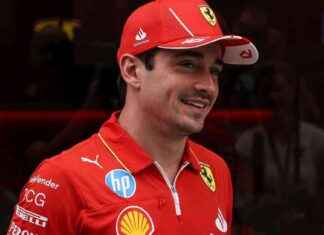A few days before the publication of his new book, Le Temps des combats, of which BFM TV has unveiled the first excerpts, Nicolas Sarkozy discussed, during an interview with Le Figaro, many subjects, ranging from the presidential election of 2027 , to the war in Ukraine via Franco-Algerian relations, to the coup in Niger and the situation in Libya.
Less than four years from the next presidential election, Nicolas Sarkozy already has his favorite, in the person of Gérald Darmanin. The former President of the Republic announces his wish to see the current Minister of the Interior take the “ultimate step” towards the Élysée in 2027. The former spokesperson for Nicolas Sarkozy “will he be able to cross another stage, […] that which leads to the presidency of the Republic? “. “I wish him, because he has obvious qualities. According to the former head of state, Gérald Darmanin is “one of the most promising forties”, adding that the “success” of one of his “friends” would give him “pleasure”.
A position for which the main interested party has already positioned himself. Recently confirmed at Matignon, he is already a bulwark against the far right of Marine Le Pen. “What worries me now is what will happen in 2027,” Gérald Darmanin told Le Figaro on Sunday, opposing his “popular compass” to “the bobo-liberal left” and the “technicians” assured of lose, he said.
“Ukraine is a link between the west and the east, it must remain so”, slice Nicolas Sarkozy, for whom this country should join neither NATO nor the European Union, referring to “false promises that will not be kept”. “I don’t see how that would be an insult,” he continued, suggesting “an international agreement providing extremely strong security assurances to protect her against any risk of further aggression.”
He recalls having “had dozens of conversations” with Russian President Vladimir Putin when he was at the Élysée Palace. “I am told that he is no longer the one I knew, I am not convinced of that”, he notes, defending “diplomacy, discussion, exchange” to “find a solution acceptable” to this conflict. And insists on a necessary “compromise” without which “this powder keg could have formidable consequences”.
Nicolas Sarkozy also believes that in Crimea, annexed in 2014 by Russia, “any backtracking is illusory”. For him, “an indisputable referendum […] will be necessary to ratify the current state of affairs”. Beyond that, he fears a “frozen conflict”, where Ukraine seeks to “reclaim what has been unjustly taken from [him]”. According to him, a “top exit” from the conflict would even consist of organizing “referendums strictly supervised by the international community to settle territorial issues in a definitive and transparent manner”, particularly in “the disputed territories in the east and south of Ukraine”.
Nicolas Sarkozy then addressed relations between France and Algeria and recommended that Emmanuel Macron not try to “build an artificial friendship” with Algerian leaders “who systematically use France as a scapegoat to hide their own shortcomings and their lack of legitimacy”. According to him, “they will always refuse it. “They need too much to divert attention from the failure they have plunged their country into by regularly blaming France for all ills.”
Emmanuel Macron is seeking to bring about a rapprochement with Algeria, in the form of a historic reconciliation, which was to materialize in particular in the spring with a state visit to France by Algerian President Abdelmadjid Tebboune. But this visit, never officially announced, has so far not been scheduled, a sign of persistent misunderstandings between the two countries. On August 6, the Algerian head of state assured Algerian television that the visit was “still maintained” but that he was awaiting the program from the French presidency.
“A state visit has conditions and must lead to results. This is not a tourist visit,” he warns.
For Nicolas Sarkozy, there is no doubt: the military coup in Niger can only end in failure and believes that it is the “long-term” maintenance of French military forces in the Sahel that has caused the anti-French hatred. “However good and generous our intentions, any mission that drags on ends up making us appear […] as an occupying force”, he adds, convinced that “Africans themselves” will understand ” the impasse into which these so-called leaders resulting from military coups are leading them”.
He also criticizes the socialist president who “dropped the Libyan file”, after the intervention of France, within an international coalition, while the regime of Muammar Gaddafi violently suppressed the uprising of its population in the spring of 2011.
He also cites former US President Barack Obama, who “self-acknowledged that it was his greatest foreign policy fault” to have “abandoned Libya’s fledgling democracy in 2012 when it needed more than ever we support it.”
Nicolas Sarkozy finally recalls not having ordered the elimination of the Libyan dictator. “This outrageous controversy has given way to the facts,” he observes, referring to “coordinated collective action, led by NATO”. “Much later, the Gaddafi clan took revenge by claiming to have financed my campaign” in 2007, he adds of one of the court cases in which the former head of state is involved.







